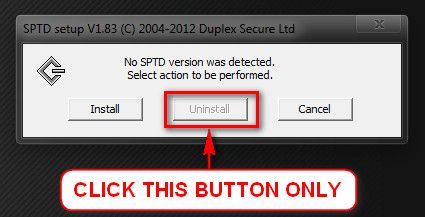Thanks for the added file :)
BSOD Analysis:
Code:
BugCheck C2, {7, 109b, 4200022, fffffa800c3948b0}
*** WARNING: Unable to verify timestamp for btmhsf.sys
*** ERROR: Module load completed but symbols could not be loaded for btmhsf.sys
GetPointerFromAddress: unable to read from fffff800036b3100
GetUlongFromAddress: unable to read from fffff800036b31c0
Probably caused by : btmhsf.sys ( btmhsf+667b )
Code:
Usual causes: Device driver, Memory
This bugcheck indicates that a thread has attempted to free the same pool allocation twice.
Code:
0: kd> !pool fffffa800c3948b0
Pool page fffffa800c3948b0 region is Nonpaged pool
fffffa800c394000 size: 140 previous size: 0 (Allocated) Mmdi
fffffa800c394140 size: 40 previous size: 140 (Free) ....
fffffa800c394180 size: 140 previous size: 40 (Allocated) Mmdi
fffffa800c3942c0 size: 140 previous size: 140 (Allocated) Mmdi
fffffa800c394400 size: 140 previous size: 140 (Allocated) Mmdi
fffffa800c394540 size: 140 previous size: 140 (Allocated) Mmdi
*fffffa800c394680 size: 420 previous size: 140 (Free) *MmCp
Pooltag MmCp : Colored page counts for physical memory allocations, Binary : nt!mm
fffffa800c394aa0 size: 140 previous size: 420 (Allocated) Mmdi
fffffa800c394be0 size: 70 previous size: 140 (Free) MmCp
fffffa800c394c50 size: 130 previous size: 70 (Allocated) btmh
fffffa800c394d80 size: 140 previous size: 130 (Allocated) Mmdi
fffffa800c394ec0 size: 140 previous size: 140 (Allocated) Mmdi
Code:
0: kd> !poolval fffffa800c3948b0
Pool page fffffa800c3948b0 region is Nonpaged pool
Validating Pool headers for pool page: fffffa800c3948b0
Pool page [ fffffa800c394000 ] is VALID.
The pool page doesn't seem to have any corruption or buffer overruns, which leads to more of a driver related cause. The pool allocation which seems to have been freed twice is related to the Memory Manager.
Code:
0: kd> k
Child-SP RetAddr Call Site
fffff880`033aeb98 fffff800`035aebe9 nt!KeBugCheckEx
fffff880`033aeba0 fffff880`0ffad67b nt!ExDeferredFreePool+0x1201
fffff880`033aec50 00000000`00000500 btmhsf+0x667b
fffff880`033aec58 0000057f`00000000 0x500
fffff880`033aec60 fffffa80`004d6253 0x0000057f`00000000
fffff880`033aec68 fffffa80`0b662000 0xfffffa80`004d6253
fffff880`033aec70 fffff800`035f6e80 0xfffffa80`0b662000
fffff880`033aec78 0000057f`f4dc72c8 nt!KiInitialPCR+0x180
fffff880`033aec80 fffffa80`0b238d50 0x0000057f`f4dc72c8
fffff880`033aec88 fffffa80`0b238d50 0xfffffa80`0b238d50
fffff880`033aec90 00000000`00000001 0xfffffa80`0b238d50
fffff880`033aec98 fffff880`00f70c70 0x1
fffff880`033aeca0 00000000`00000000 Wdf01000!FxWmiIrpHandler::m_WmiDispatchTable+0x1030
-----------------------------------------------------------
Code:
0: kd> lmvm btmhsf
start end module name
fffff880`0ffa7000 fffff880`0fff0000 btmhsf T (no symbols)
Loaded symbol image file: btmhsf.sys
Image path: \SystemRoot\system32\DRIVERS\btmhsf.sys
Image name: btmhsf.sys
Timestamp: Thu Jan 20 12:27:56 2011 (4D382A4C)
CheckSum: 00048375
ImageSize: 00049000
Translations: 0000.04b0 0000.04e4 0409.04b0 0409.04e4
Your Intel Proset Bluetooth HighSpeed Filter Driver seems to be a possible cause and potentially outdated, please update the driver from here - https://downloadcenter.intel.com/def...me_downloadctr


 Quote
Quote
